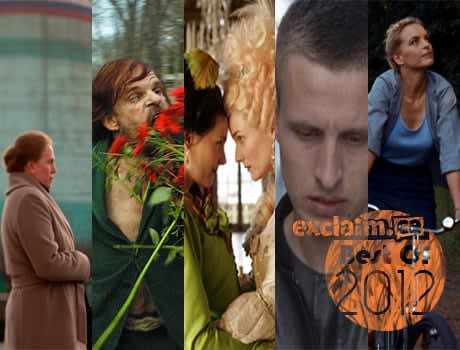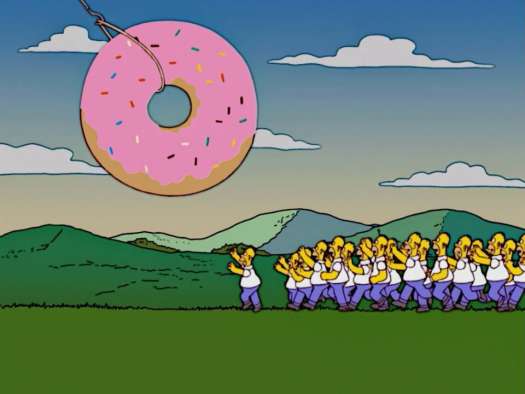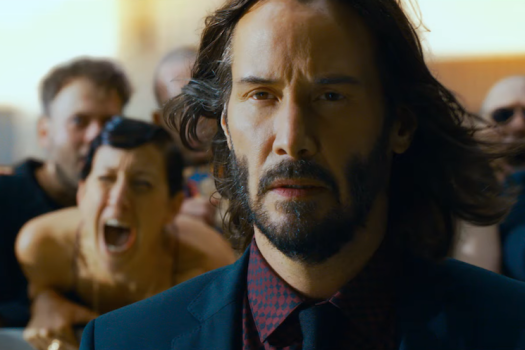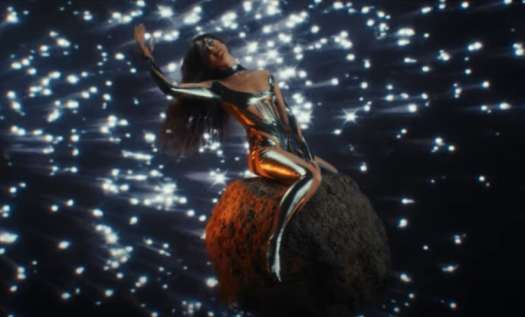The war for the Best Film of 2012 continues today with our Foreign Language picks. Many touching and engaging foreign films were released theatrically in North America throughout 2012 but only a select few could make our year-end Top 10 list.
Exclaim!'s Best Films of 2012: Foreign Language
10. The Intouchables
Directed By Olivier Nakache & Eric Toledano
(Alliance)
The Intouchables is an uplifting French buddy picture in which a carefree, but life-embracing, Senegalese immigrant (and ex-con) named Driss (Omar Sy) becomes the live-in employee and companion of the middle-aged quadriplegic millionaire, Philippe (François Cluzet). As the friendship between this unlikely pairing grows, Driss becomes a life force to Philippe, giving him a zest to live again despite his bodily impediments, liberating him from the confines of tedious high society, despite initial hesitation. While the premise of the film, which is based on a true story, borders on cliché—being a slightly more politically conscious version of Scent of a Woman--Sy and Cluzet have wonderful on-screen chemistry, each bringing their own energy to the film. It gives everything a very accessible Odd Couple dynamic that is simultaneously grating and infectious, proving to be quite touching in the absence of critical thought. As far as formulaic, mainstream fluff goes, The Intouchables is some of the best you'll see this year.
Daniel Pratt
9. Holy Motors
Directed By Leos Carax
(Mongrel Media)
It'd be possible to dismiss Leos Carax's love-letter to what he seems to view as the bygone glory days of celluloid and clunky motorized cameras as emotionally-stunted nostalgic hand-wringing had he not crafted a film so oblique and technically accomplished that it invites the imposition of nearly any meaning the viewer chooses to ascribe it. Perhaps though, the permeable and superficial potential reading of art (especially the surreal) as bait for the intellectually insecure is part of Carax's deliberately serpentine intent. Or maybe the film is about the roles we all play in our daily lives in a camera-saturated world where every street corner, every alley, every room can be a stage, and every fart, purchase and pose a dramatic moment to someone. Maybe it means all of these things. Maybe it means nothing. Maybe it doesn't matter. Beyond the preoccupation with trying to ascertain the specific purpose of Carax's sometimes inscrutable symbolism, Holy Motors is a tour de force of acting and practical filmmaking. Denis Lavant's chameleon range is nothing short of extraordinary as his character, Mr. Oscar, rides to his daily "appointments" in a limousine, transforming himself through the intimate application and removal of astounding makeup between his destinations. Whether or not you appreciate purposeful pretension, Holy Motors is expertly constructed cinema that's certain to set the mental hamster wheel turning.
Scott A. Gray
8. Oslo, August 31st
Directed By Joachim Trier
(Films We Like)
Despite what most salacious cinematic handlings of the subject seem content to agree upon, not all drug addicts are uneducated wastrels. Addiction stems from the inability to otherwise cope with the extreme dissatisfactions life never tires of throwing our way. Norwegian director Joachim Trier's understated adaptation of a novel about a recovering drug addict on leave from his recovery program—to interview for a journalist gig and visit his old friends—is admirable for its even-keeled depiction of a segment of society typically treated as pariahs for their choice to inject, snort or inhale instead of watch, eat, fuck or shop the pain away. Anders Danielson Lie invests the central role with pathos born of diffidence that's as relatable as the more pedestrian disappointments of a friend lamenting his nearly non-existent sex life and the dull routine that settles with a spouse when conversation has been exhausted and social gatherings once deemed fun are shunned in favour of beer and video games. Unafraid to recognize the commonality of people from all walks of life, Oslo, August 31st is an atypically mature, intimate and unbiased look at the challenge some people have with simply engaging in life, regardless of their intellect or level of self-awareness.
Scott A. Gray
7. Elena
Directed By Andrey Zyvagintsev
(FunFilm)
Everything about Andrey Zvyagintsev's minimalist treatise on a post-Communist Russia can be summed up in the opening image. Outside of a large, modernist, well-maintained home, a crow lands on a tree branch and remains. Inside, Elena (Nadezhda Markina), the second wife of the wealthy Vladimir (Andrey Smirnov), tends to her husband's routine with a cold formality. Elena's son, who lives far from the opulence of his mother's acquired lifestyle, begs her for money to send her Grandson to college. So, when Vladimir gets sick and Elena panics that her inheritance might go to his indifferent, moderately ungrateful, daughter, she makes a move. With a heightened dramatic score that ramps up before the action takes place, implying intent, Zvyagintsev's coy political allegory unfolds with a crisp deliberateness and formal stillness that adds a distressing level of intensity. Though it was clearly too slow and calculated for a Western audience, having a very limited U.S. theatrical run, Elena is a structural masterwork that quietly creeps up on you beyond the final frames, implying something unseemly and terrifying about human selfishness left unchecked.
Robert Bell
6. Tabu
Directed By Miguel Gomes
(Films We Like)
As much a criticism of French Colonialism as it is a love letter to cinema of the past, Miguel Gomes's chaptered, black and white art film, Tabu connects the past with the present both stylistically and thematically. Referencing F.W. Murnau's 1931 melodrama of the same name, it positions itself inversely, opening with the "Paradise Lost" chapter in a modern context. These modern scenes, driven by Capitalist ethos—demonstrated by casino binges from the elderly Aurora (Laura Soveral)—and the exploitation of kindness—Pilar (Teresa Madruga) spends her days praying for people that use her—are filmed with a coldness reflective of the titular paradise lost. Once the film shifts to the past with "Paradise," which focuses on a love affair between young Aurora (Ana Moreira) and her neighbour (Carloto Cotta), the style becomes that of a silent film with dreamlike images and guiding voiceover. Although the preoccupation with nostalgia is in itself indicative of emotional limitations and an inability to cope with the present, this politically and cinematically conscious film impressively makes its point with acute stylistic observation and juxtaposition. Indeed, the present is a direct result of our past successes and failures, much as politics tend to be reactive. Tabu addresses these concepts in a kinetic and challenging manner that is as oblique as it is beautiful.
Robert Bell
5. Headhunters
Directed By Morten Tyldum
(Alliance)
Initially, Headhunters is set up as yet another heist movie, with Roger Brown (Aksel Hennie), a headhunter that moonlights as an art thief, detailing the rules of committing the perfect crime. His opulent lifestyle and trophy wife (Synnøve Macody Lund) are little more than transparent artifice and greed. But as things progress, Roger makes a bad judgment call, pissing of the wrong person, which results in one of the most protracted, propulsive and outrageously entertaining and intricate cinematic chase sequences ever. While fleeing from vengeful CEO Clas Greve (Nikolaj Coster-Waldau), Roger winds up fighting dogs, running from speeding Mack trucks, being brutalized in car accidents and even hiding beneath the surface of a pool of faeces. Even more impressive than the sheer kinetic energy of this nasty Norwegian thriller is the amount of planning and plotting that went into making the entire puzzle so fascinating to put together. Every seemingly incidental scene and moment of the film winds up having a bigger purpose. Though grossly overlooked upon its limited theatrical release in North America, Headhunters was probably one of the best popcorn movies of 2012.
Robert Bell
4. Barbara
Directed By Christian Petzold
(Films We Like)
Set in 1980s East Berlin, Barbara is a surprisingly quiet, dense and thoughtful film that obliquely addresses the political while primarily focusing on the personal. In small, measured doses, director Christian Petzold fleshes out the titular protagonist, an intelligent, reticent, guarded female doctor whose patrician demeanour belies her recent appointment to a small rural hospital—state retribution for requesting permission to move west or some other offence. The ominous Stasi threat is known less by its continued screen presence than by the ways in which Barbara behaves—keeping to herself, restricting personal commentary, vigilant awareness of her surroundings, etc.—and by the ways in which commonplace sounds—a car engine being turned off, a doorbell ringing, a bucket of water being hauled by cleaning staff, etc.—trigger feelings of dread and apprehension in the audience. Like great literature, Barbara understands the importance of showing—not telling—and like artful seduction, it recognizes the power of taking its time, refraining from revealing too much, too fast. Barbara's reservedness is her armour, her guarantor of survival. Yet her emotional remove and perpetual mistrust of others are as isolating, controlling and destructive to her personal happiness as the state control she disdains. While the film works as a great psychological thriller in a subtly political vein, its strength comes from its insightful investigation of human emotions and behaviour. How do you connect, communicate or engage with others in a landscape where trust is tenuous, motivations are unknown and one wrong appraisal could prove perilous? How do you make decisions without History's hindsight? Engrossing from start to finish as it evaluates the moral quandaries and emotional boundaries that exist with or without state control, Barbara functions as an excellent metaphor about the vulnerability required of anyone entering into a romantic relationship. It takes strength and resilience to reveal one's self—the flawed, messy, imperfect self kept hidden from public scrutiny—and to be open to the possibilities of love—bliss, heartbreak and everything in between.
Erin O'Neill
3. A Royal Affair
Directed By Nikolaj Arcel
(Mongrel Media)
Historical dramas tend to feature elaborate interior design sets and ornate costumes with poodle wigs or chest-baring bodices, but they rarely focus much attention on philosophical matters. Proving that fact is often stranger than fiction, A Royal Affair follows the doomed love affair between eighteenth-century Denmark's Queen (Anna Karenina's Alicia Vikander) and the King's doctor (Casino Royale's Mads Mikkelsen) that is based as much on passion as in a shared belief in Enlightenment values. While bestowing the virtues of Rousseau and The Age of Reason, with a focus on progressive reform that questions the role of church and nobility in the creation of state policy, this film is also a visual feast thanks to sumptuous cinematography and carefully considered details (the Queen's earrings are mirrored by the ornate chandeliers dangling overhead, for example). The royal liaison is symbolically interchangeable with the forward-thinking politics being advocated. The death of one necessitates the death of the other. In the film's most devastating scene, the camera, taking the perspective of a man who realizes his imminent demise, lets us look down with him at his booted feet, which will momentarily give out on him as he is led to his execution. The intimacy of this unexpected, shared point-of-view is heartbreaking, as is the country's return to regressive rule. The reform sought out in A Royal Affair (the abolition of torture, the abolition of the censorship of the press, the abolition of serfdom, etc.) works well as a foil to the current debate around matters like gay marriage that, given a century or two, could perhaps make our contemporary political leaders seem as outdated as the film's eighteenth-century forbears.
Erin O'Neill
2. Farewell, My Queen
Directed By Benoit Jacquot
(eOne)
Self-consciously told from the perspective of the male eye—noting that history is implicitly told from a singular male perspective—Benoît Jacquot's heavily layered and deeply observant look at the final days in Louis XVI's royal court leading up the French Revolution is a sudsy, clever play on female power dynamics. When Marie Antoinette (Diane Kruger) learns of her potential doom, she pushes her presumed lover and Duchess, Gabrielle de Polignac (Virginie Ledoyen) into the periphery, leaving her single-minded, celebrity (or power) obsessed reader Sidonie (Léa Seydoux) to weasel and manipulate her way into a position of importance, despite warning from her fellow servants. Amidst the cerebral, exceedingly complex exchanges between the two are a variety of seemingly incidental structural decisions that comment on the political landscape, such as the juxtaposition of night time chaos and pragmatic panic with the sense of banality and ease that comprises the day, suggesting forced performance of normalcy as delusion or impediment. Although, contrary to idealistic thought, just as Sidonie pushes her way behind the curtains of Antoinette's heart and the common people force their way through the gates of the royal court, there's a sense that those seeking equality are less motivated by justice than they are establishing power for themselves.
Robert Bell
1. Amour
Directed By Michael Haneke
(Mongrel Media)
Lauded German writer/director Michael Haneke has never been one to shy away from harsh emotional truths, but with Amour, he has created what might just be the most soul-wrenching depiction of the inevitable decay of vitality ever committed to the screen. Unflinchingly, the story follows a pair of cultured retired music teachers, Anne (Emmanuelle Riva) and Georges (Jean-Louis Tritigant), who are still very much in love when the body-betrayal of declining health strikes. Every moment of fading tenderness, frustration and indignity the couple suffer through is compassionately documented as the inexorable march of reality slowly chips away at the vestiges of optimism. A masterful use of deliberate pacing, the careful creep of time holds the audience a prisoner of circumstance just as Georges and Anne are held captive by the unavoidable approach of mortality. Amour is by no means easy to watch; all but the most emotionally insecure will be profoundly affected by Riva and Tritigant's egoless performances and Haneke's remarkably artifice-free direction. It's not just the glaring spotlight of mortality that makes the film such a shattering experience, but the unsentimental questioning of what love really means in a society that values a pulse above quality of life or awareness. How far will you go to put the best interests of your partner ahead of your own? It's a tough question, but one all of us will have to answer in a best case scenario.
Scott A. Gray
Exclaim's Best Films of 2012:
Foreign Language

BY Exclaim! StaffPublished Jan 10, 2013



